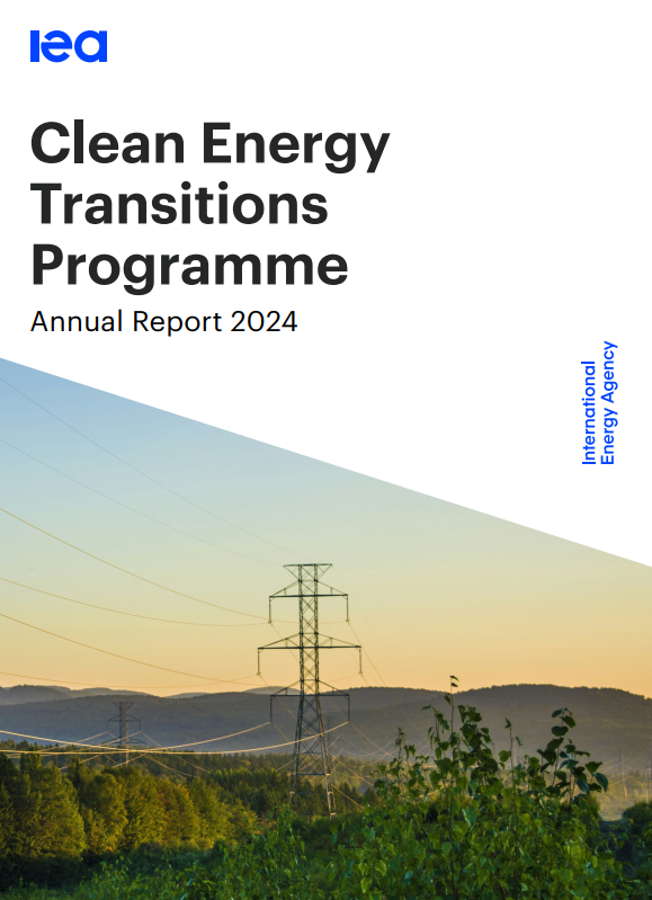
|
Clean Energy Transitions Programme 2024
The Clean Energy Transitions Programme (CETP) is the International Energy Agency’s flagship initiative for accelerating clean energy transitions worldwide. Since its inception in 2017, the CETP has played a vital role in tackling the diverse challenges of energy transitions across the globe, fostering partnerships and providing tailored, actionable solutions. The programme is structured around three key pillars: directly supporting national transitions; strengthening multilateral co‑ordination; and delivering global analysis to inform policy dialogue.
2025.03
OECD/IEA
|
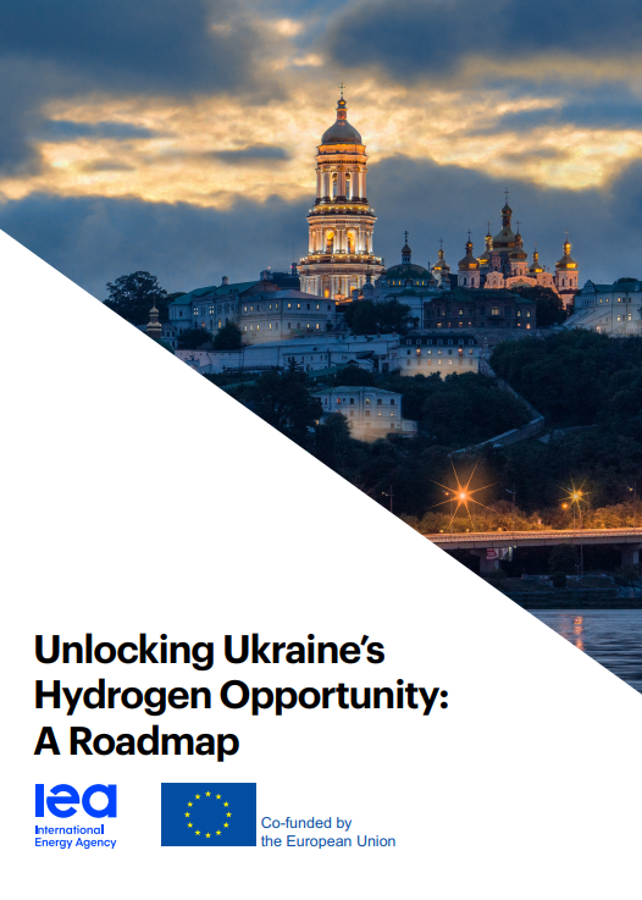
|
Unlocking Ukraine’s Hydrogen Opportunity: A Roadmap
Ukraine’s energy sector has been severely affected by the Russian Federation’s full-scale invasion. The power sector went from having a large capacity surplus before the war to a power deficit in 2024 due to Russia’s attacks. This has focused attention on energy security and restoring the reliability of supply. Hydrogen demand from conventional applications in refining and ammonia has also plunged, falling 80%, with most of these assets in southern Ukraine, where the frontline and occupied areas are located. Overall economic damage from the war has been extensive, with reconstruction costs previously estimated by the World Bank at more than USD 0.5 trillion – three times Ukraine’s GDP.
2025.03
OECD/IEA
|
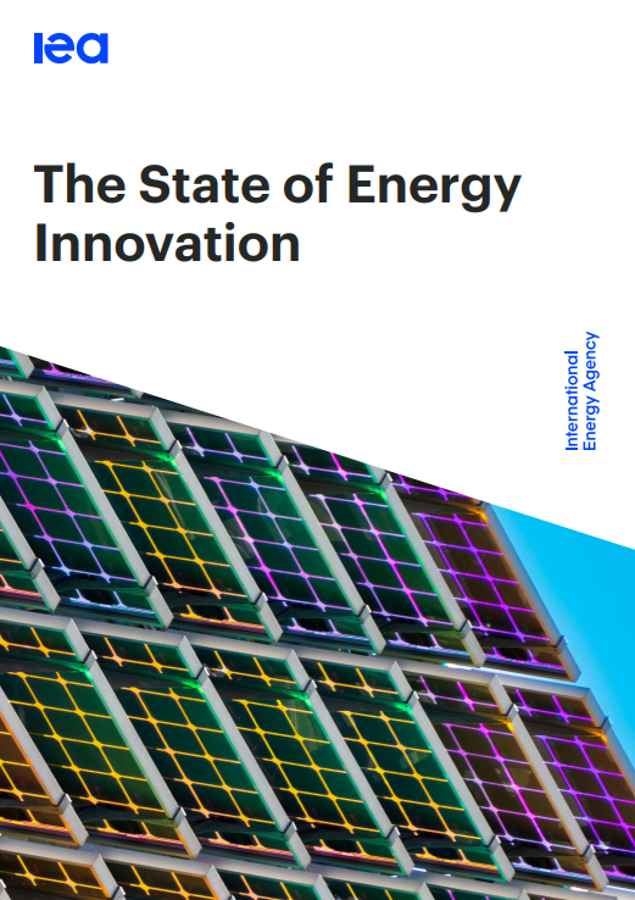
|
The State of Energy Innovation
Global energy innovation is evolving rapidly, shaped by technological advances, increased public and private investment, and a shifting international landscape. This report provides a comprehensive assessment of recent progress and emerging challenges in energy technology innovation, drawing on over 150 innovation highlights and a survey of practitioners across 34 countries.
2025.03
OECD/IEA
|
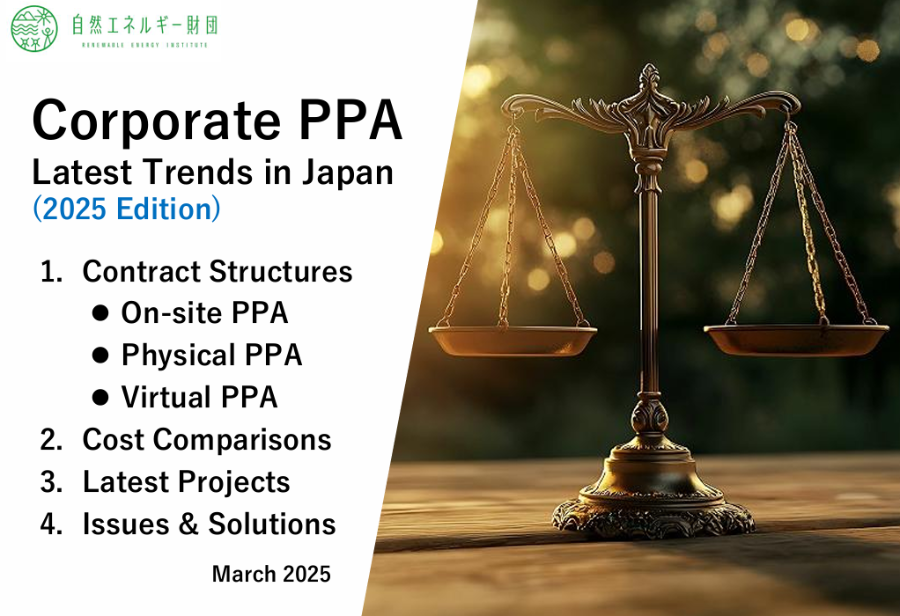
|
Corporate PPA: Latest Trends in Japan (2025 Edition)
Renewable Energy Institute published an updated information package “Corporate PPA: Latest Trends in Japan (2025 Edition)”.
Corporate PPAs are becoming popular in Japan to procure renewable electricity for business and industrial use. Under the current circumstances, where the price of fossil fuels remains high while the decarbonization of businesses is required, the benefits of corporate PPAs are being recognized from both economic and environmental perspectives.
This information package puts together the latest trends in corporate PPAs in Japan. Typical contract structures applicable in the Japanese electricity system are presented for on-site, off-site physical and virtual PPAs. The featu
2025.03
Renewable Energy Institute
|
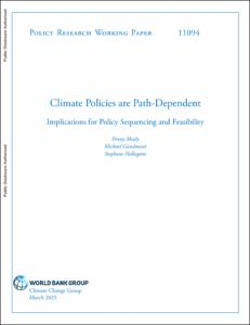
|
Climate Policies are Path-Dependent: Implications for Policy Sequencing and Feasibility
Although the feasibility of introducing climate policies underpins global efforts to curb climate change, there has been limited analysis estimating the likelihood of introducing specific policies in different country contexts. Drawing on a dataset of climate policies introduced globally over the past 50 years, this paper explores patterns in climate policy adoption to quantify policy feasibility across countries. In constructing a ‘Climate Policy Space’ network based on the co-occurrence of policies across countries, the paper shows that climate policy adoption is path-dependent: countries are significantly more likely to introduce policies that are related to their prior climate policymaki
2025.03
World Bank
|
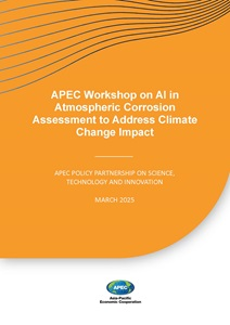
|
APEC Workshop on AI in Atmospheric Corrosion Assessment to Address Climate Change Impact
Climate change causes extreme weather events, increasing the risk of structural failure before their design lifetime. Due to unique atmospheric factors in each economy, it is necessary to collect and analyze domestic data to obtain artificial intelligent (AI) corrosion prediction tools for adaptation and mitigation.
2025.03
APEC
|
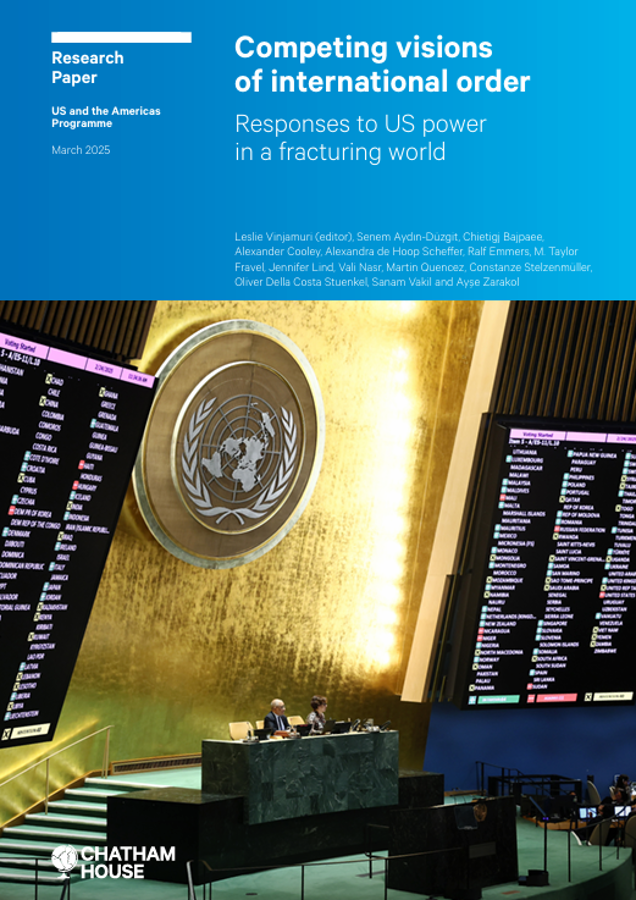
|
Competing visions of international order : Responses to US power in a fracturing world
This paper takes stock of these developments, examines the US’s changing role and ambitions as a global power, and explores how 11 other key states are adapting. It examines how states are positioning themselves in this more fractured world, and how some are seeking to disrupt or even undermine the existing order.
2025.03
Chatham House
|
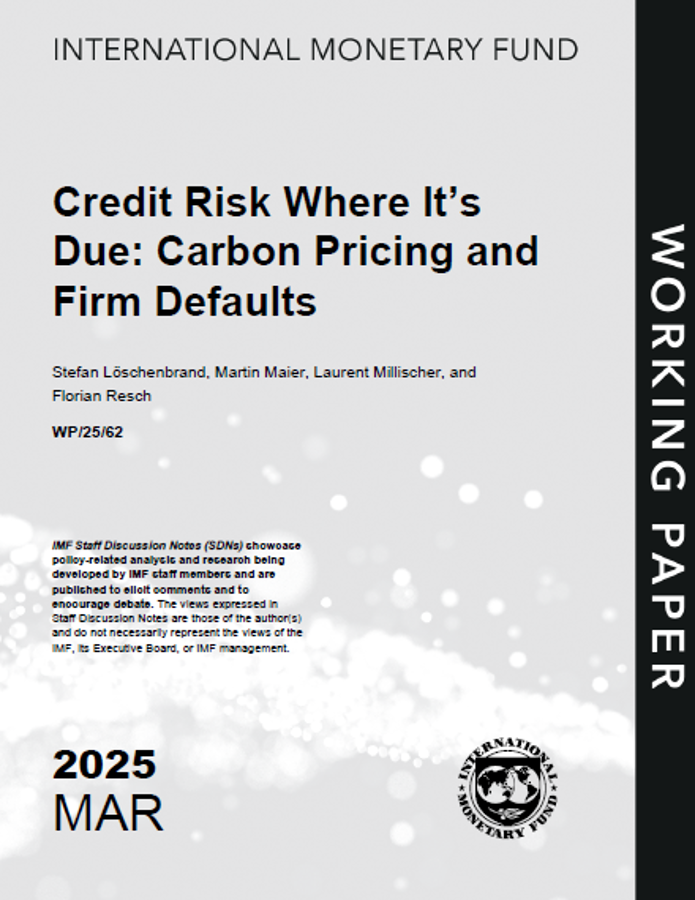
|
Credit Risk Where It’s Due: Carbon Pricing and Firm Defaults
This study investigates carbon pricing-induced credit risk, the potential negative impact of carbon pricing on firms’ ability to meet their financial obligations. Applying a well-established credit assessment model to a novel data set combining financial statements and emissions data, we subject the over 2.5 million borrowers of the euro area’s largest banking groups to two carbon pricing stress scenarios.
2025.03
IMF
|
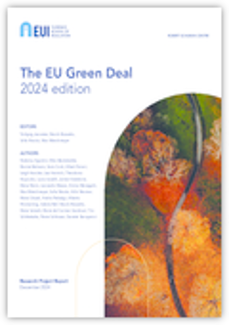
|
The EU Green Deal (2024 edition)
In this report, we focus on the fundamentals of energy and climate policy as reformulated in the EU Green Deal. The 2024 edition of this report includes updates following the adoption of the Fit for 55 Package, the REPowerEU Plan and the recent reforms of electricity and gas markets in Europe. The reader is guided through the landscape of EU policies to achieve climate neutrality by 2050.
2025.03
European Commission
|
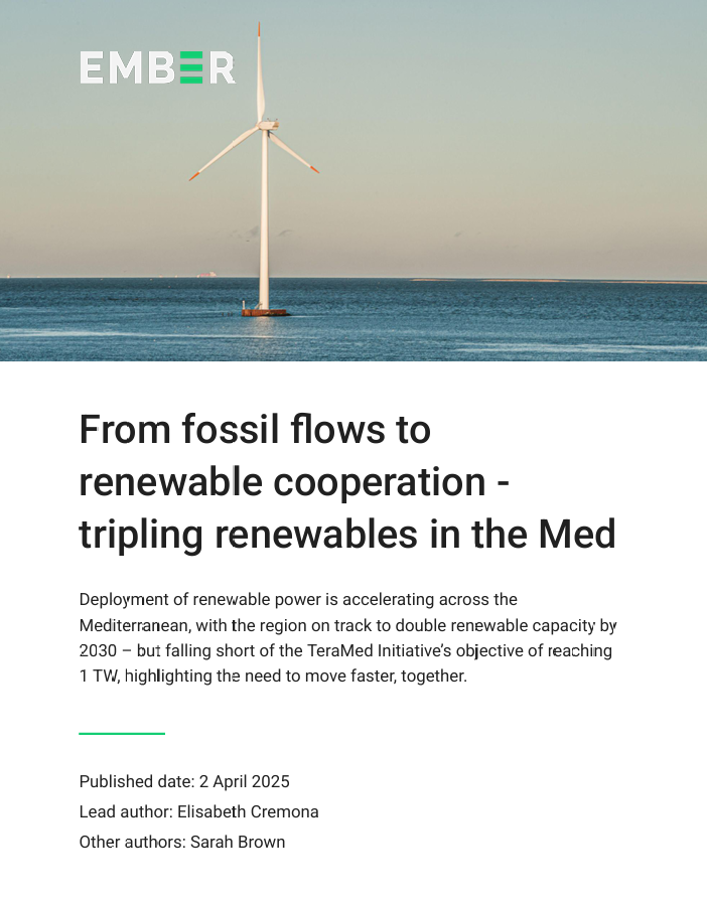
|
From fossil flows to renewable cooperation – tripling renewables in the Med
Deployment of renewable power is accelerating across the Mediterranean, with the region on track to double renewable capacity by 2030 – but falling short of the TeraMed Initiative’s objective of reaching 1 TW, highlighting the need to move faster, together.
2025.04
Ember
|

|
RE-powering India’s heavy industries: 20 GW today, 24/7 tomorrow
Indian heavy industries—steel, cement, and aluminium—despite their reliance on captive coal, can profitably integrate 20 GW of solar today. But how ready are they for a 24/7 renewable-powered future?
2025.04
Ember
|
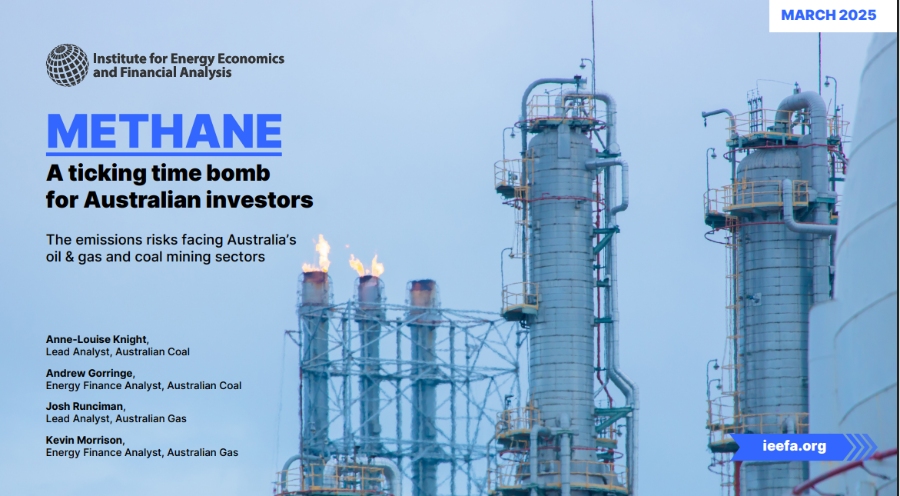
|
Methane: A ticking time bomb for Australian investors
Greater methane abatement action is required by oil & gas and coal mining companies in Australia to decrease their climate-related risk exposure and reduce greenhouse gas emissions.
2025.03
IEEFA
|
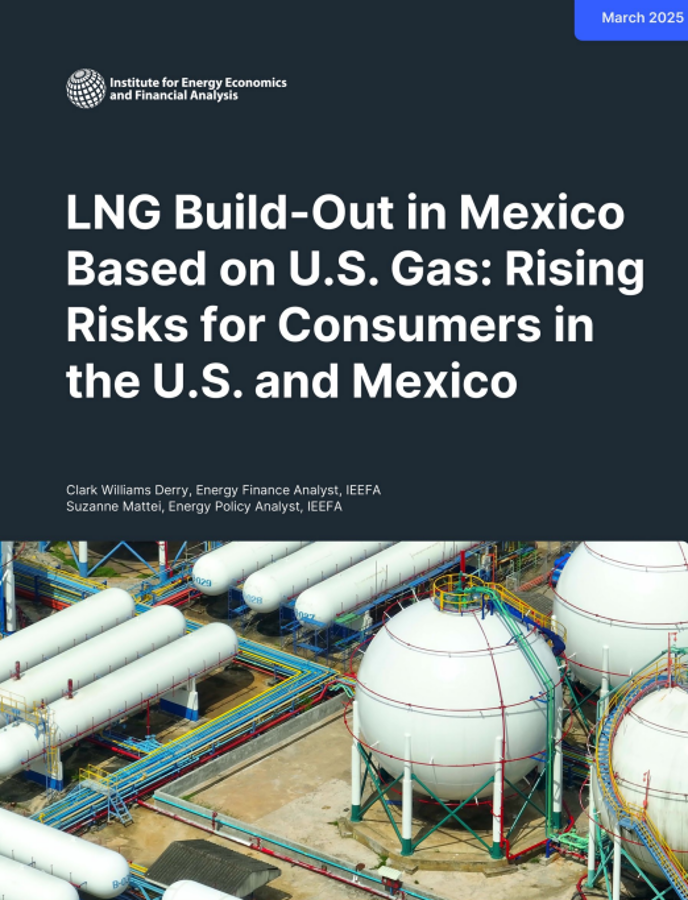
|
LNG build-out in Mexico based on U.S. gas : Rising risks for consumers in the U.S. and Mexico
North America’s liquefied natural gas (LNG) boom jeopardizes the long-term stability of the continent’s gas and electricity markets, threatening to increase consumer gas and utility bills in both the United States and Mexico.
2025.03
IEEFA
|
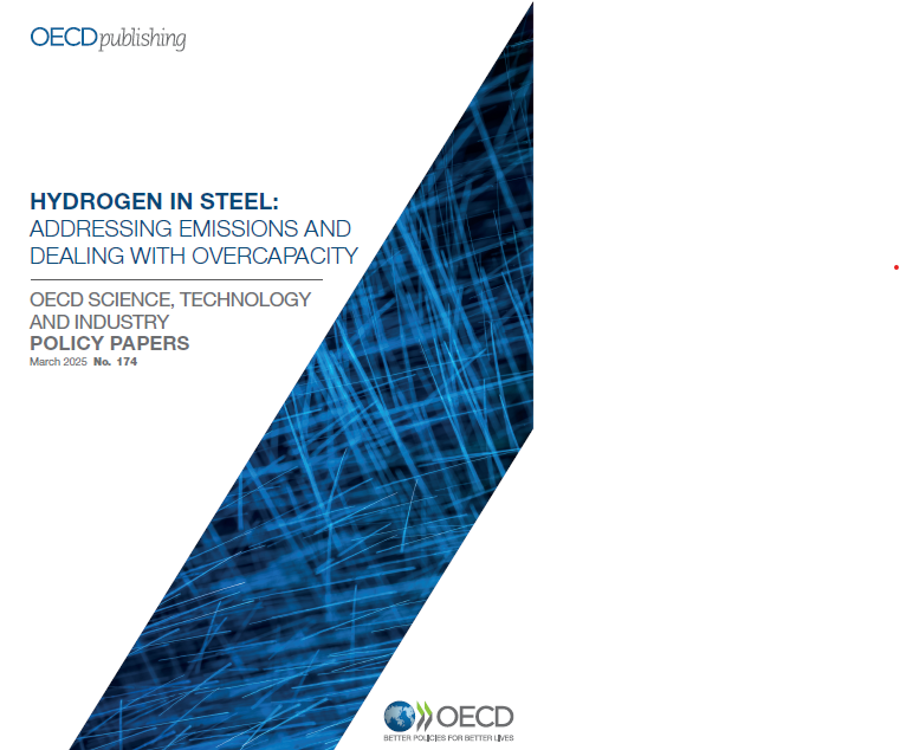
|
Hydrogen in steel : Addressing emissions and dealing with overcapacity
The adoption of hydrogen in steelmaking presents a significant opportunity to decarbonise the industry, potentially reducing emissions by up to 90% compared to traditional methods. However, the glut of overcapacity undermines the transition to hydrogen-based solutions, limiting investment and delaying progress. This paper explores the prospects for hydrogen-based steelmaking in a low-carbon future, set against a backdrop of overcapacity and market distortions, highlighting how these challenges compound to the inherent difficulties of deploying such solutions.
2025.03
OECD
|
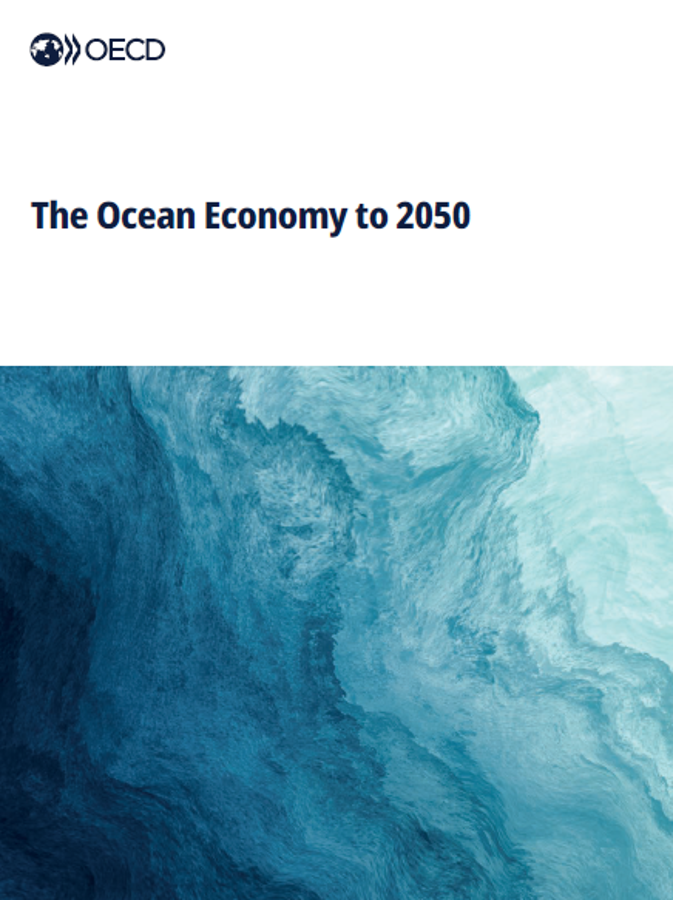
|
The Ocean Economy to 2050
The ocean economy has long been a powerful driver of global growth, creating jobs, fuelling development, and ensuring food security for millions worldwide. If the ocean economy were a country, it would be the fifth largest economy in the world. However, climate change, environmental degradation, lagging productivity, and slow digital transformation are intensifying pressures on marine ecosystems and economic potential.
2025.03
OECD
|
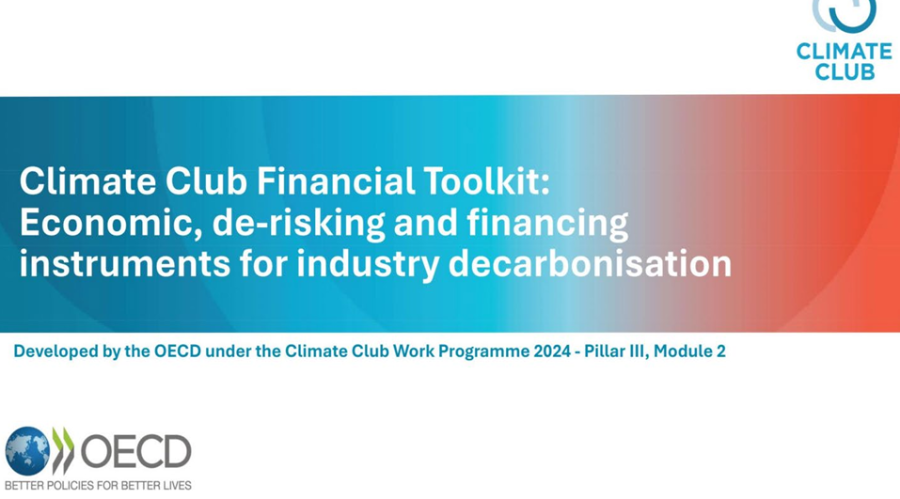
|
Climate Club Financial Toolkit : Economic, De-risking and Financing Instruments for Industry Decarbonisation
The toolkit provides an overview of 28 economic, de-risking and financing instruments that can be used for financing industry decarbonisation, both in emerging markets and developing economies (EMDEs) and in developed countries.
2025.03
OECD
|
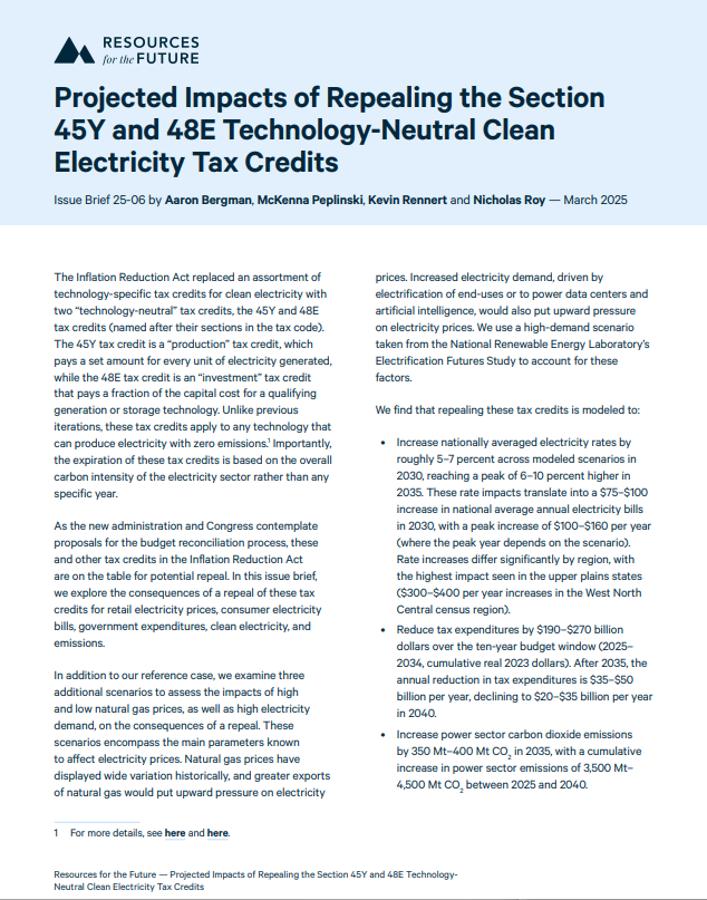
|
Projected Impacts of Repealing the Section 45Y and 48E Technology-Neutral Clean Electricity Tax Credits
This issue brief examines the potential effects on electricity prices and emissions by repealing tax credits from the Inflation Reduction Act.
2025.03
RFF
|
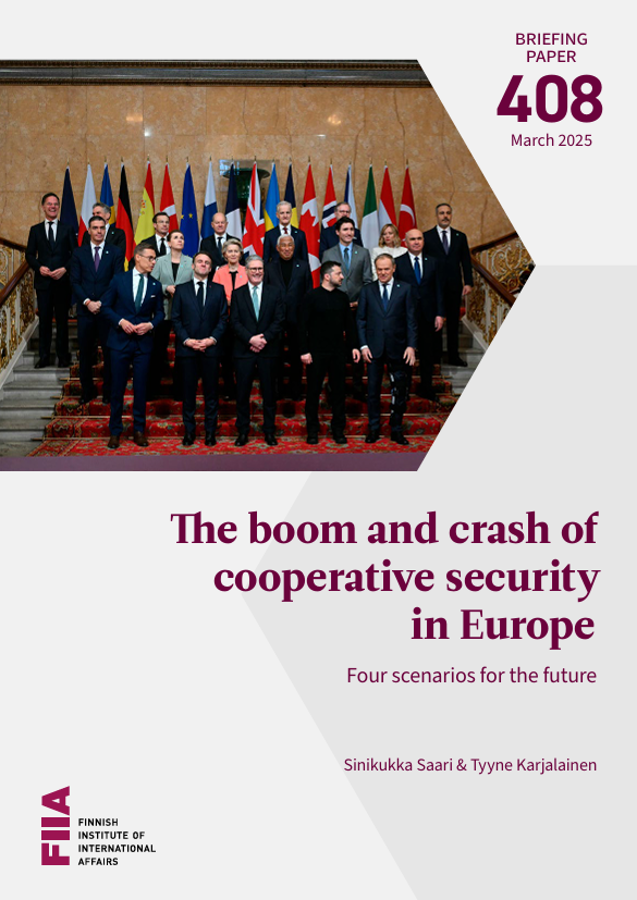
|
The boom and crash of cooperative security in Europe: Four scenarios for the future
The post-Cold War European cooperative security order, based on shared liberal norms and institutions, has been challenged by Russia’s revisionism and aggression – and more recently by the alienation and even hostility of the United States.
2025.03
FIIA
|
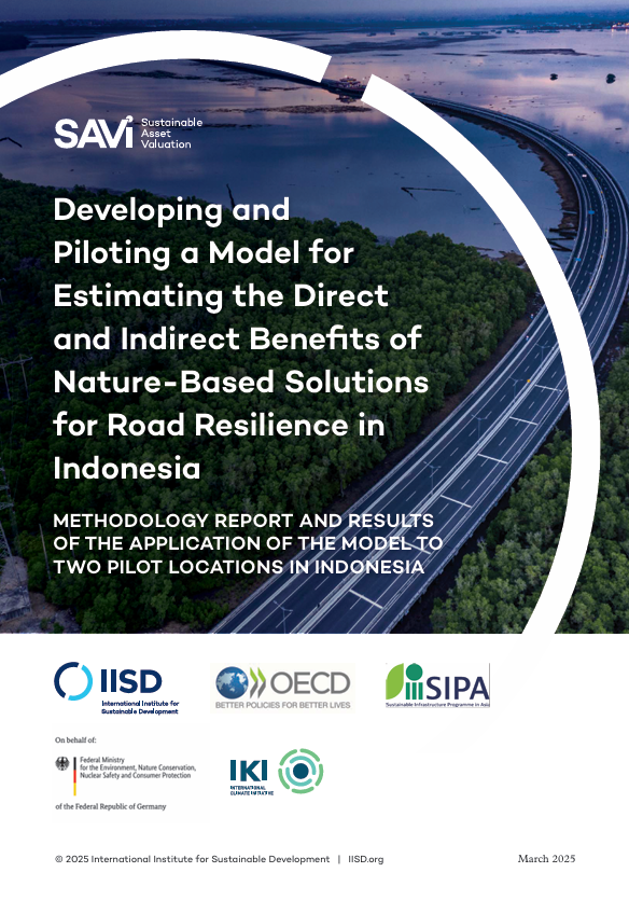
|
Developing and Piloting a Model for Estimating the Direct and Indirect Benefits of Nature-Based Solutions for Road Resilience in Indonesia
Indonesia's complex geographical, climatic, and socio-economic context presents challenges for road infrastructure resilience. Traditional engineering approaches often struggle to address the range of natural hazards—landslides, erosion, and flooding—that threaten road infrastructure, especially when roads are built at the expense of natural land. Integrating nature back into the design and planning of road development offers a solution.
2025.03
IISD
|
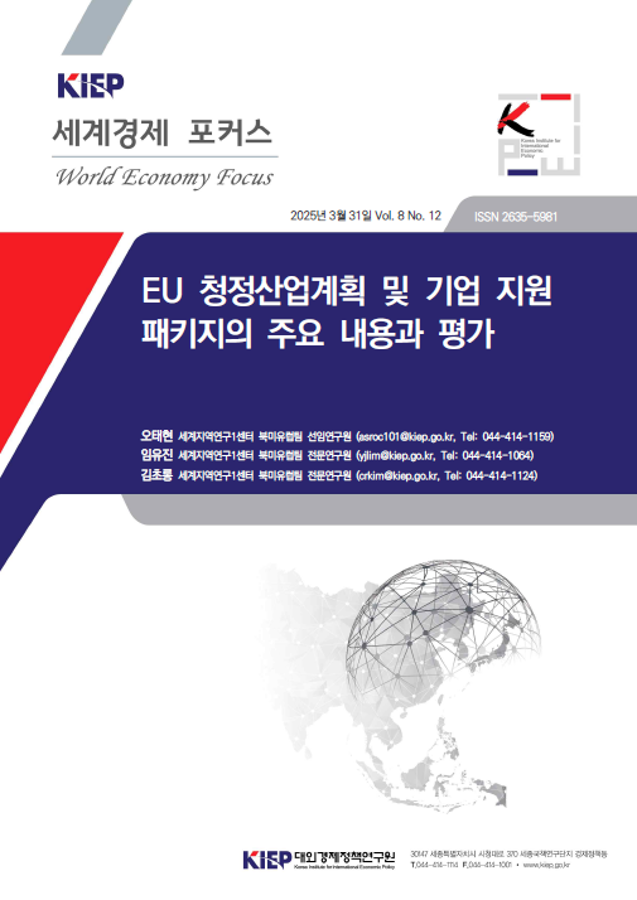
|
EU 청정산업계획 및 기업 지원 패키지의 주요 내용과 평가
2025년 2월 26일 EU 집행위원회의 플래그십 정책인 청정산업계획(Clean Industrial Deal)과 기업 지원 패키지(일명 ‘Omnibus Package’) 발표하였다. 청정산업계획 및 옴니버스 패키지는 지정학적 갈등 고조, 경제성장 동력 약화, 기술경쟁 심화 등에 대해 EU 차원에서 효과적으로 대응해야 할 필요성이 나타난 것에 그 기반을 두고 있다.
2025.03
대외경제정책연구원
|
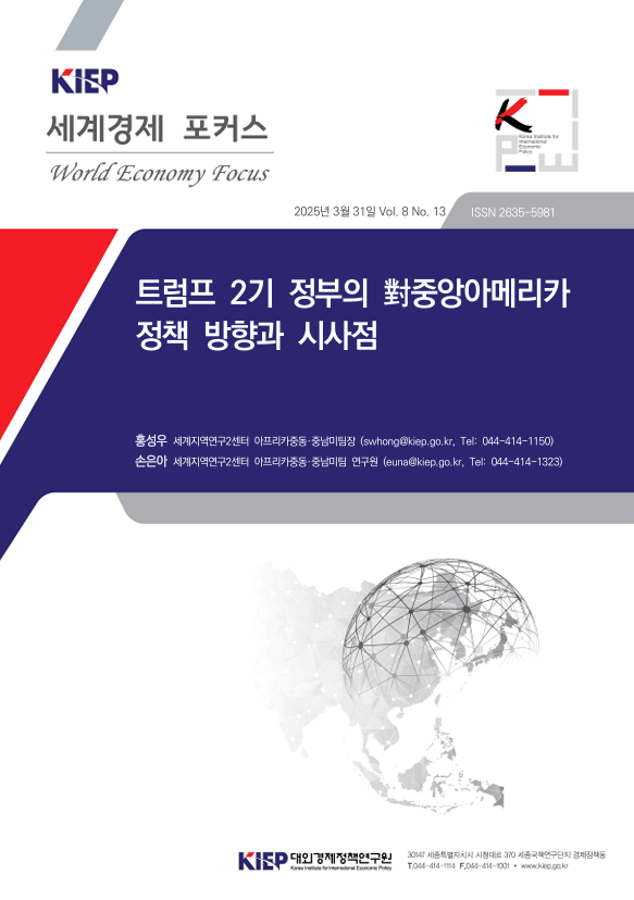
|
트럼프 2기 정부의 對중앙아메리카 정책 방향과 시사점
트럼프 1기 정부에서는 중앙아메리카(이하 중미)를 경유한 불법 이민 차단을 대(對)중미 정책의 최우선 과제로 설정하여 다양한 압박을 통해 이를 해결하고자 하였을 뿐만 아니라 중미 지역 내 중국의 영향력 확대를 우려하며 외교적 압박을 지속하였다. 미 국무장관 순방 결과를 토대로, 트럼프 2기의 對중미 정책은 △ 불법 이민 억제를 최우선 과제로 설정, △ 중미 내 중국의 영향력 적극 배제, △ 협력을 전제로 한 경제적 인센티브 제공 등으로 요약할 수 있다.
2025.03
대외경제정책연구원
|
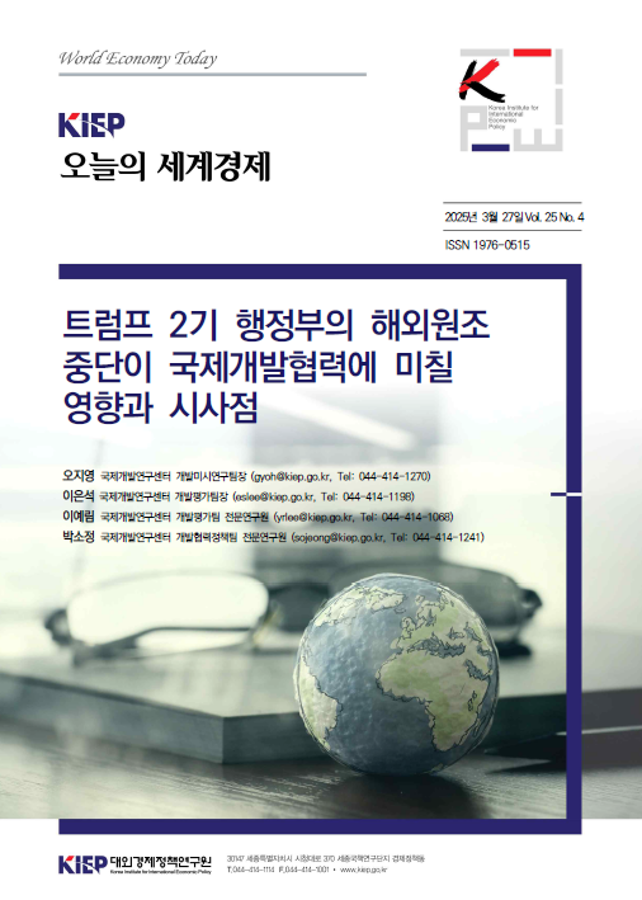
|
트럼프 2기 행정부의 해외원조 중단이 국제개발협력에 미칠 영향과 시사점
미국 우선주의를 강조하는 트럼프 2기 행정부는 해외원조 전면 중단 행정명령을 발표하고 미국 해외원조 국제개발처(USAID)의 인력을 대규모 감축하는 등 미국의 해외원조 축소를 감행 중이다.
2025.03
대외경제정책연구원
|
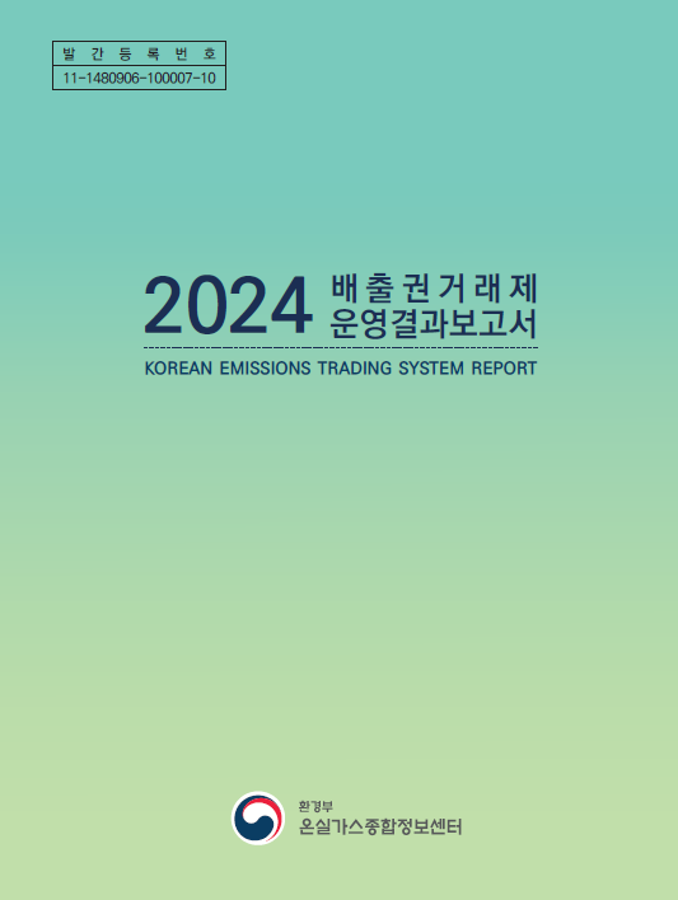
|
2024 배출권거래제 운영결과보고서
본 보고서는 배출권거래제 제3차 계획기간(2021~2025년)의 제3차 이행연도인 2023년의 운영결과에 대한 보고서이다. (보고서 제목은 발간연도 기준). 「온실가스 배출권의 할당 및 거래에 관한 법률」 제8조 및 제9조에 따라 지정된 할당대상업체의 배출권 할당, 거래 및 제출(‘21.1월~‘24.8월) 결과 등을 분석하였다.
2025.03
온실가스종합정보센터
|
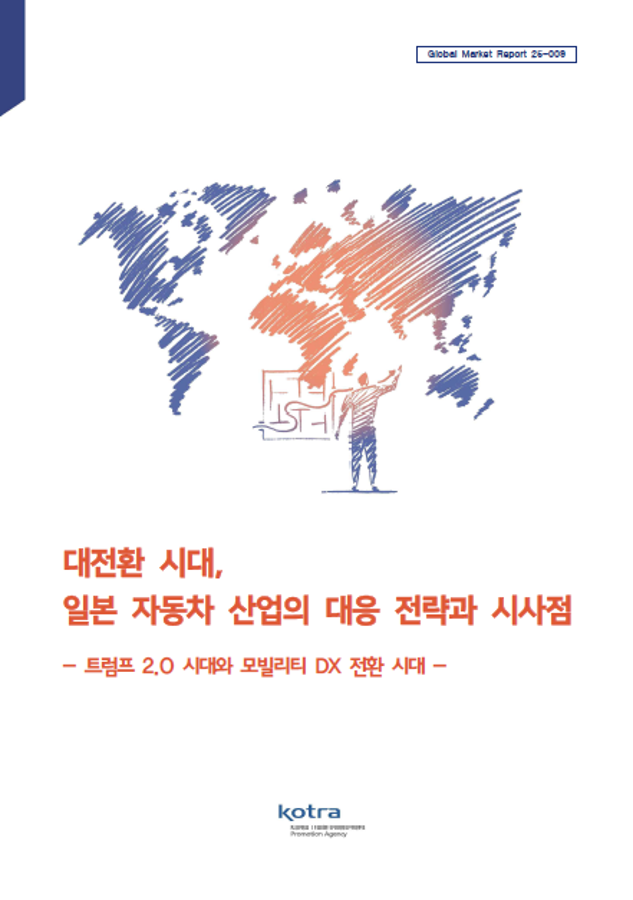
|
대전환 시대, 일본 자동차 산업의 대응 전략과 시사점: 트럼프 2.0 시대와 모빌리티 DX 전환 시대
2024년 일본 자동차 산업은 그간의 회복세에서 벗어나 생산 및 판매 실적 모두 감소세로 전환되었다. 특히 도널드 트럼프 전 대통령의 재집권과 함께 예고된 관세 부과 조치는 일본 자동차 산업의 대미 수출에 큰 타격을 줄 것으로 예상된다.
우선, 일본 자동차 산업의 글로벌 생산 실적은 코로나19 팬데믹 이후 회복세를 이어왔지만, 2024년에는 전년 대비 6.6% 감소한 2,410만 대를 기록했다. 판매 실적 역시 부진을 면치 못해, 전년 대비 1.1% 감소한 2,453만 대로 집계되었으며, 이 중 해외 판매가 전체의 83.5%를 차지했다. 이러한 상황에서 트럼프 신정부가 자동차에 대해 25%의 관세를 부과할 경우, 일본의 실질 수출은 향후 2년간 0.22% 감소하고, 실질 GDP 역시 0.08% 하락할 것으로 전망된다고 일본 종합연구소(NRI)는 분석했다.
2025.04
KOTRA
|
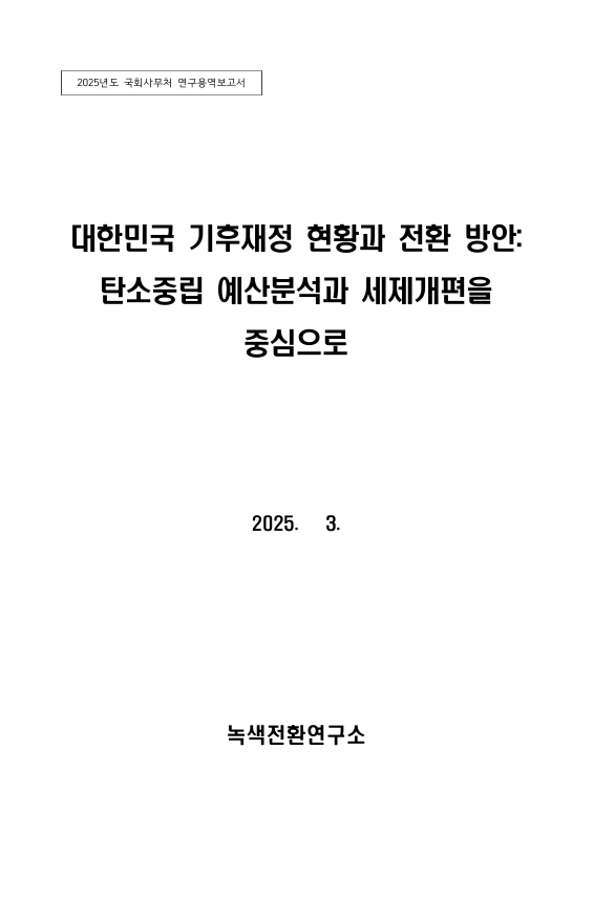
|
대한민국 기후재정 현황과 전환 방안 : 탄소중립 예산분석과 세제개편을 중심으로
본 연구는 크게 두 가지 주제로 구성되어 있다. 첫 번째는 ‘기후재정의 현황과 혁신 과제’이며, 두 번째는 ‘기후조세제도의 현황과 개선 방안’이다. 먼저, ‘기후재정의 현황과 혁신 과제’에서는 기후재정의 범위와 규모를 두 가지 관점에서 검토하였다. 하나는 국가 기본계획의 재정투입계획이며, 다른 하나는 온실가스 감축인지예산제도이다. 특히 2025년 기후예산안의 규모를 분석함으로써 현재 기후재정이 안고 있는 문제점을 도출하고, 이를 바탕으로 필요한 혁신 과제를 제시하였다. 다음으로, ‘기후조세제도의 현황과 개선 방안’에서는 교통·에너지·환경세, 배출권거래제, 그리고 화석연료 보조금에 대한 현황과 그 한계를 분석하였다. 이를 통해 보다 효과적인 기후조세제도를 구축하기 위한 개선 방안을 제안하였다.
2025.03
국회사무처
|
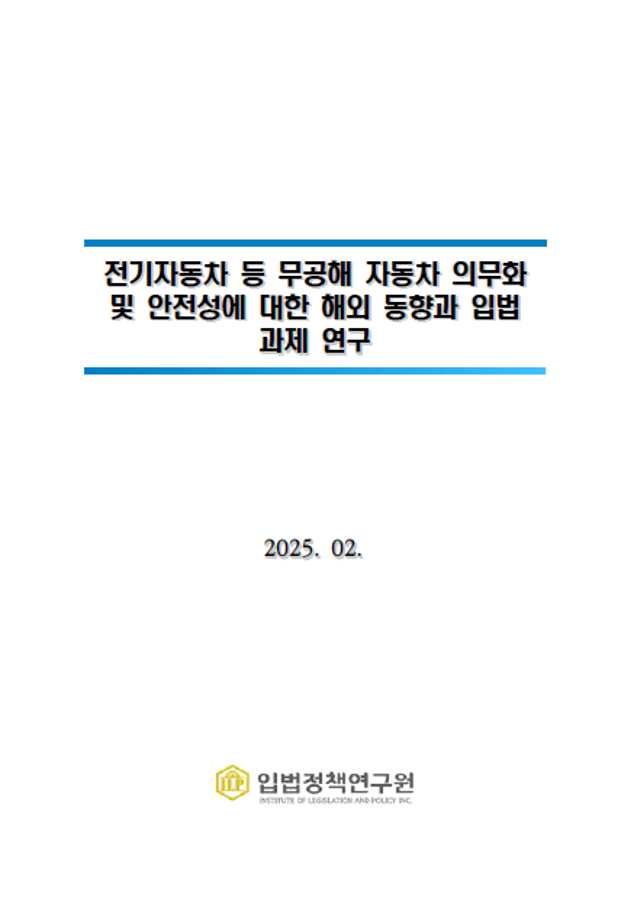
|
전기자동차 등 무공해 자동차 의무화 및 안전성에 대한 해외 동향과 입법과제 연구
이 보고서는 향후 전기자동차 등 무공해차로의 전환하는 과정에서 해외 각국의 입법적 동향을 살펴보고 그에 따른 우리나라의 대처
방안을 제시하였다. 구체적으로는 제2장에서 무공해차 의무화 관련한 각국의 입법 동향을, 제3장에서는 무공해차의 대표적인 형태인 전기자동차 에서 발생할 수 있는 화재 등에 대처할 수 있는 안전성 문제, 제4장에서는 사이버 위협에 대처할 수 있는 안전성 문제를 검토하고자 한다. 그리고 마지막 제5장에서는 이를 토대로 국내의 전기자동차 등 무공해차의 의무화 및 안전성 관련 대처방안을 제시하고 있다.
2025.03
산업통상자원중소벤처기업위원회
|
